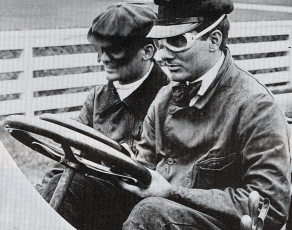
Walter C. White
Drove the only steam-driven racer in the Vanderbilt Car Races
Nationality: American
Born: 1876
Died: September 29, 1929
White Sewing Machine Company
The White Sewing Machine Company, was founded in Massachussets in 1858, but moved by the founder, Thomas H. White to Cleveland, Ohio in 1866. The company began making steam powered automobiles in 1900. Cleveland, Ohio was a center of early American automobile production. Other manufacturers in the city included the Winton Motor Car Company, The Cleveland Motor Car Company, and the Peerless Motor Car Company. White Steamers were a popular brand of steam car.
The White Sewing Machine Company produced a lot more than sewing machines and cars: in 1901, they also manufactured, among other things, bicycles, roller skates, phonographs, screw machines, and kerosene lamps.
Thomas's sons Rollin, Windsor, and Walter, were all auto enthusiasts, and helped get the company into the automobile industry. In November 1906, the automaking part of the business split off into a separate company, named the White Company. After 1911, the company stopped making Steamers and focused on producing gasoline driven engines. Over the course of their steam-making career, the company produced 9,122 White Steamers. In 1918, the company stopped making cars (except if they were specially ordered) and concentrated on making trucks. It still makes trucks and buses.
From The Encyclopedia of Cleveland History
WHITE MOTOR CORP.
The WHITE MOTOR CORP. was created out of the White Sewing Machine Co. (see WHITE CONSOLIDATED INDUSTRIES, INC.), begun by THOS. H. WHITE† in 1876. His son, ROLLIN HENRY WHITE†, invented the auto flash boiler in 1899, and with the aid of his 2 brothers, Windsor and Walter, diversified the sewing machine company's products by introducing trucks and the White Steamer automobile in 1900. Though White outsold its nearest auto competitor 2 to 1, Thomas White dismissed the importance of the car, which led his sons to organize the White Motor Car Co. in 1906 on Canal St. in the FLATS. In 1909 the company made its first vehicle under its own name. During World War I, the company shifted to trucks and stayed with the product after the war, becoming the number one maker of trucks and custom vehicles. When sales plummeted during the Depression, White temporarily merged with Studebaker in 1932, but 2 years later it independently reorganized as the White Motor Corp. Under Robt. Black, the firm became a major producer of heavy-duty trucks and buses. During World War II, the White plant at 842 E. 79th St. was converted to the manufacture of military vehicles.
During the postwar period, White Motor acquired leadership in the heavy-truck and the farm-equipment fields by purchasing small truck makers and small farm-machinery companies such as the Oliver Corp. (see CLETRAC, INC.). The company increased sales from $130 million in 1950 to $770 million in 1967 and bought EUCLID, INC. in 1968, hoping to increase its market share in the off-road truck field. White Motor went heavily into debt as a result of these transactions. After a merger with White Consolidated Industries failed in 1970, White Motor hired Semon "Bunkie" Knudsen to reorganize the company. Though White Motor showed a $20 million profit in 1973, Knudsen's leadership could not counteract years of mismanagement, coupled with changes in the industry, inflation, and recession. He sold off one-third of its assets, including the profitable Euclid, Inc. hauler operation, moved headquarters from ERIEVIEW to Eastlake, and cut employment. White moved truck production from the E. 79th St. plant to Virginia and converted it to parts fabrication in the late 1970s.
In Sept. 1980 White Motor filed for bankruptcy, and between then and Dec. 1981 lost $311 million. In Aug. 1981 Sweden's AB Volvo bought all of White's truck-producing plants except the Cleveland plant at E. 79th St., because of its age and large pension fund liability. White sold the plant in 1983 and made a pension and benefit settlement with the workers. After a prolonged bankruptcy proceeding, the White Motor Corp. ceased to exist in 1985. Volvo kept the White name for a number of years before finally retiring it in the late 1990s.
Last Modified: 15 Dec 2002 12:50:32 PM

Really think the couple up on Jericho Tpke are the same couple that officially toured the LIMP 1958 - 1967. Could also…